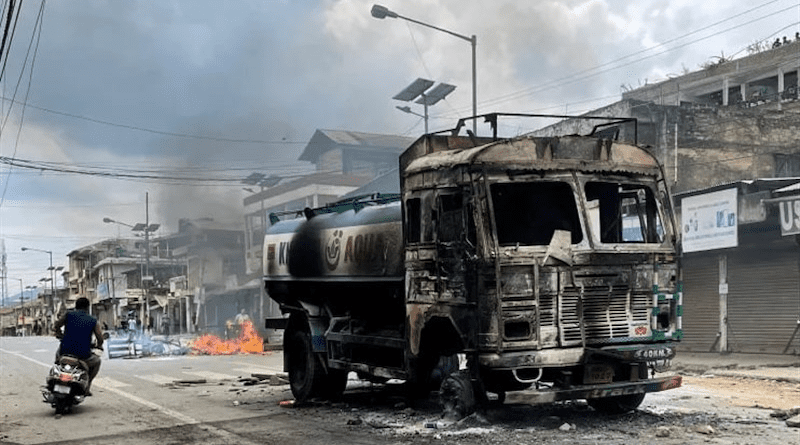India: Breaking Down ‘Statelessness’ In Manipur – Analysis
A dangerous and unimaginable situation has gripped Manipur since May 2023, with armed mobs defying security forces by trying to kill people, and setting fire to civilian and commercial properties, religious institutions, and politicians’ residences. Hundreds of villages have been vacated and thousands of houses and places of worship burnt.
Over 50,000 displaced people are in makeshift camps, without any possibility of returning to their homes anytime soon. The state and the central administration’s appeals for peace have largely been ignored. Eminent voices have termed Manipur as “stateless.” Over 3,000 weapons looted from police stations are still in the hands of civilians masquerading as village guards and part of the raiding mobs. If the situation is not brought under control, the current death toll of 110 could thus rise further.
Not a Religious Conflict
At first glance, the violence appears to be a religious conflict between Christian Kuki tribals and the predominantly Hindu Meiteis (some Meiteis are Scheduled Caste and some are Muslims). Attempts to categorise them in this manner are however not only wrong, but irresponsible attempts to fan communalism.
At the heart of the intense conflict between the two communities is a cocktail of factors, including the typical demography of the state, contestation over land resources, perception of marginalisation, governance deficit, and mobilisation.
Violent Mobilisation
The demand for Scheduled Tribe (ST) status for the majority Meiteis fanned the first round of violence on 3 May. The Kukis organised a rally in the Churachandpur district, opposing what they perceived as an attempt by the Meiteis to buy land in the hills, which for centuries have been their home. Their sense of anxiety appeared to have been heightened by the Meitei-dominated state government’s previous attempts to designate hill areas as reserved forests, protected forests, wildlife sanctuaries, and wetlands.
The state government had launched a number of eviction drives in the preceding months to vacate the hills of Kuki encroachers. The encroachers allegedly indulged in poppy cultivation and sheltered illegal Myanmarese migrants, which had already brought the situation to a boil. On the day of the rally, violence broke out in Churachandpur and spread quickly to other districts, including the Imphal valley. Over 4,000 weapons were looted by rampaging mobs from police stations in the subsequent days. Only 1,000 of those weapons have been returned or recovered.
The rally by the Kukis led to a round of intense mobilisation by some of the Meitei organisations. These groups argue that ST status would allow the Meiteis the right to legally own land in the protected hills. The Imphal valley constitutes only 10 per cent of the state’s total area but houses 60 per cent of the population, predominantly the Meiteis. Moreover, over the decades, the alleged presence of illegal migrants from Bangladesh and Myanmar, and other settlers from mainland India, have created intense pressure on the valley’s land resources. Hence, the valley-based Meiteis must have a right to settle in any part of the state, including the hills.
Incidentally, during the 2022 state legislative assembly elections, the ‘ST status for Meiteis’ issue hadn’t figured in the manifestos of any party in the state. Thus, a minor issue—with questionable support—among the Meiteis, who largely consider themselves as high caste and with a rich martial history, became a central issue around which the divisions with the Kukis played out. By 8 May, over 62 people were killed, and hundreds of temples and churches were burnt. Imphal Valley was vacated of the Kukis, and the hills, of the majority of the Meiteis.
Intense Polarisation and a Governance Deficit
The state and central governments had an opportunity to intervene and calm things down as the first round of violence subsided within a few days. However, the state government, whose position on the demand for ST status for the Meiteis is unknown, continued to blame illegal Myanmarese migrants and Kuki militants for the violence. The chief minister reiterated his promise to end narco-terrorism in the Kuki areas, a charge that has been categorically dismissed by the Kukis.
The Central government initially appeared to support the BJP-ruled state government. It instituted an inquiry to investigate the origin of the violence and identify the perpetrators. By the time Union Home Minister Amit Shah toured Manipur towards the end of May, appealing for peace and asking people to surrender the looted weapons, a demand for a ‘separate administration for the hills’ had been firmed up by ten Kuki members of the legislative assembly, from across party lines. Chief Minister N. Biren Singh lost credibility among both the communities. The Home Ministry’s proposal for a 51-member peace committee was a non-starter as both Meitei and Kuki organisations boycotted it. The battleground for a second round of violence was indeed ready.
Shrinking Space for Reasonable Voices
Amid the complete ethnicisation of politics and civil society activities in the state, politicians and leaders of community-based organisations have shunned the language of peace and have essentially become protagonists of acrimony. This has opened up a vast space for ‘local volunteers’—armed men claiming to defend their communities—and dormant insurgent outfits to use violence to gain legitimacy. Even with a sizeable security forces presence, the administration has found it extremely difficult to contain the violence, not just in the remote hills, but in the heart of the state capital, Imphal, where two ministerial residences have been burnt down.
Tailpiece
The complexity of the ongoing conflict needs to be factored into any effort to restore order in Manipur. Violence must be brought to a halt for any peacemaking efforts to start. A solution overseen by the current state chief minister is unlikely to be acceptable to the Kukis. Manipur needs urgent central initiatives to ensure its stability. On the foreign policy front, too, continued instability won’t augur well for India’s Act East policy, of which Manipur is a key constituent.
This article was published by IPCS

